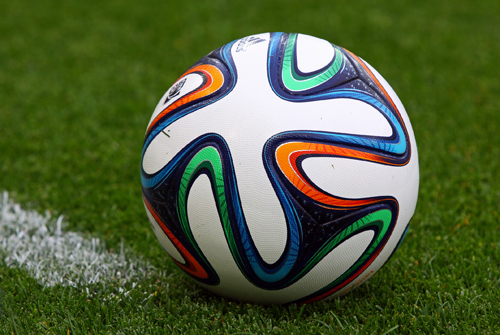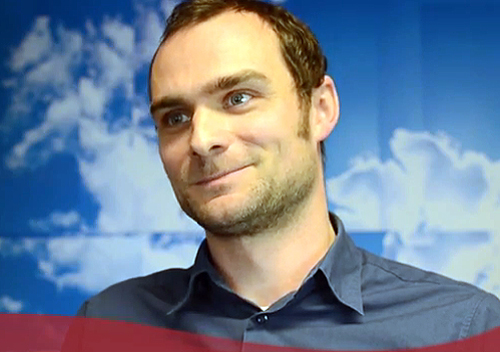
When the Berlin Wall fell in November 1989, Alan McDougall was thinking about what was often on his 14-year-old mind: soccer. The end of the Cold War registered only as a backdrop to the coming weekend’s contest on the pitch in southern England.
“I do remember playing football that weekend, and somehow having an association of my regular life going on while these events were occurring that were world-changing,” says McDougall, now a U of G history professor. “But I wasn’t really thinking of their global import. I was probably thinking about scoring more goals in the game.”
As a talented young striker on the soccer pitch, he harboured dreams of soccer glory. Soon enough, he had to choose between soccer and school. That’s how McDougall ended up studying history at Oxford, and how he wound up paying far more attention to communist-era East Germany than his teen self could have expected.
Still, it all comes back to the soccer pitch, where today more youngsters than ever are playing the game here in Canada. “It’s an interesting time to write about football.”
With this year’s World Cup playing out in Brazil, he’s publishing a new book tying together the “beautiful game” and the former East German dictatorship. The People’s Game: Football, State and Society in East Germany will be published by Cambridge University Press in July.
The book discusses how communist authorities tried but failed to control soccer behind the Iron Curtain. The state succeeded in moulding Olympic athletes, from swimmers to weight-lifters, into medal-winning machines in what McDougall describes as an attempt to boost its fragile self-identity. But like a ball squirting free of a tangle of players, soccer eluded attempts by the government – and its agencies such as the state secret police – to stamp the game in its image.
Football was played widely in East Germany, with numerous clubs and players competing and overlapping at various levels from local to international competition. Soccer went on not because of the regime but in spite of it, he says.
The regime often underestimated the strength of fans’ loyalty to their teams. “The communist regime, particularly in the early days, tried to root this out by uprooting clubs in certain neighbourhoods and putting them in cities where they felt football clubs should be, but over the years they found it hard to combat the local sporting culture.”
Some state actors were die-hard football supporters themselves and loath to mess with the game. That included the head of the secret police, a huge fan of Berlin’s Dynamo – the most successful and hence most reviled club in the country.
For disaffected youth, even soccer hooliganism opened a path of resistance. “It was another way of sticking a finger up at the regime, thumbing your nose at it, and creating a distance from the authorities just in what you wore and the ways in which you behaved that were generally seen as antisocial: excessive drinking, rude chants, colonizing public spaces like trains and train stations as well as stadiums themselves.”
Football’s resistance to authority extends to other places and times, he says. From Nazi Germany to the communist Soviet Union to apartheid South Africa, “regimes have tried to shape football to their interests, but it’s quite an elusive and quite a fluid sport. That meant it could be a site of co-operation with the regime, but it could also be a site of broad resistance to it.”
Even in soccer-mad Brazil, this year’s World Cup brought out a different kind of resistance, with protesters arguing against a “corporatized event” and calling for more attention to social services such as housing and schools.
During his research, McDougall interviewed fans and former players in Germany about their interactions – and even run-ins – with the authorities. He also pored through extensive archives of the government, secret police and sports groups – all opened after 1990.
He’s written The People’s Game as a scholarly work for what he calls “the intelligent football fan.” For World Cup viewers seeking a more grassroots football fix between games this summer, he recommends Fever Pitch by British writer Nick Hornby.

Born in Canada, McDougall grew up playing and watching soccer in England. “Football was the great passion of my life, and to be able to combine that with a work assignment was pretty exciting.”
He’s watching the ongoing matches in Brazil, but he’s not rooting for a particular country. “I love the World Cup, but nationalism has never appealed to me.”
A southerner in England, he supported Liverpool Football Club in the north. Now he lives in Toronto, but his favourite hockey team is the Ottawa Senators. “Something about the whole self-pitying Leafs culture rubs me up the wrong way.”
In 2004, McDougall published a book about youth politics in East Germany.
This fall, he will lead U of G undergrads to London for a semester abroad. He plans to take the group to Liverpool, where he hopes they’ll catch a game, but he insists it’s not just self-promotion. “There are other reasons, like the Beatles, to go to Liverpool.”
At home in Toronto, he still plays six-a-side. He’s also instilling the sport in his two children. Referring to his oldest daughter, he says, “When she was 18 months old, I enrolled her in a soccer course, literally on the first day she was legally eligible for it. That probably tells you something of my thinking on these things.”
Click to LEARN MORE about Prof. Alan McDougall’s research.